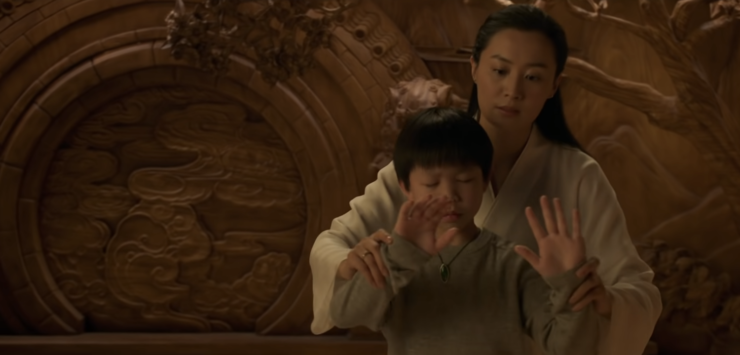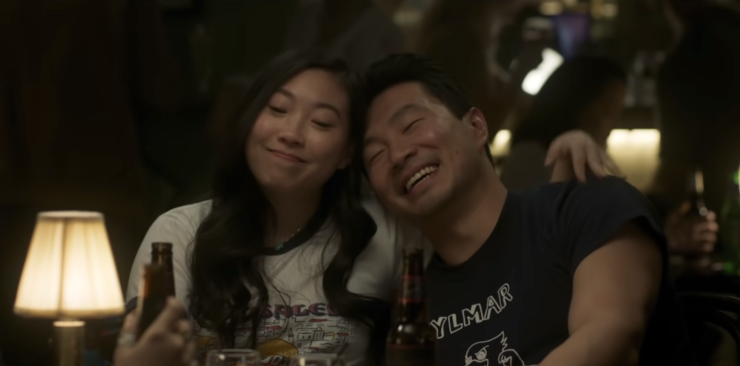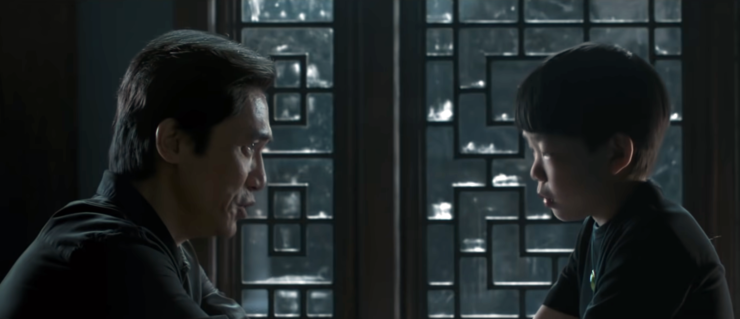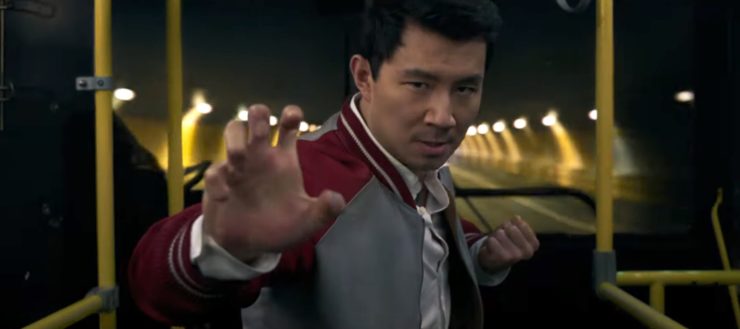It’s not a spoiler to say Shang-Chi and the Legend of the Ten Rings is a martial arts film. After all, superhero films are about action, one-on-one fights, and big set pieces. (Thankfully, it’s no Iron Fist.) The film delivers the dynamic martial arts choreography made famous to the west by the likes of Bruce Lee and Jackie Chan. It ticks all the boxes for fans of the genre: a training montage, a wooden practice dummy, and a weapons upgrade; it even throws in a tournament (okay, fight club) for good measure. Honestly Shang-Chi could have stopped there and it would’ve been enjoyable enough. But it goes further. It engages and gently subverts other hallmarks of Asian cinema—both those made in Asia and the portrayal of Asia(ns) in English-speaking productions.
(Spoilers follow.)
In the opening prologue, against the backdrop of a lush bamboo forest, Shang-Chi’s parents Wenwu and Ying Li have a wuxia enemies-to-lovers fight that every Asian drama stan saw coming a mile off. Good versus evil, strength versus balance. It hits all the notes: physics-defying moves, wind-swept hair and lingering looks as the music crescendos. Wuxia dramas invariably portray a life of discipline and order. Often rules include celibacy or prohibiting relationships with rival sects. Fights therefore are a way to bend those rules. Even today, public displays of affection are rare in Asian cinema, but a fight is akin to an intimate dance; a permissible reason to touch. Here was a production team that clearly respected what had come before. As both a nod to Crouching Tiger, Hidden Dragon and The Untamed, it’s cheesy, deliberately ladling it on thick—but it works.
Then abruptly, we are pulled across continents and eras to modern day San Francisco. Thrown into the everyday life of Shang-Chi, the karaoke-loving parking valet. And that is exactly where the film plants its feet: between old and new, tribute and critique.

I was expecting an Asian dragon in Shang-Chi. I’d blame Hollywood but who doesn’t want a generous sprinkling of dragon in all their fiction (Mulan, Spirited Away, Dragonball Z, Raya and the Last Dragon, I could go on…)? What took me by surprise was the faceless furball, Morris the DiJiang or Hundun. Years ago I attempted to read Classics of Mountains and Seas, an ancient Chinese mythical bestiary. It’s turgid and mundane, rendered readable only by artist illustrations. The headless DiJiang was a clear stand out: a yellow sack with six feet and four wings. Oh, and they know how to sing and dance. The writers could have chosen a less obscure nine-tailed fox or guardian lion; even a qilin or dragon turtle—relatively unknown in the West but familiar to Chinese audiences. Having a DiJiang spoke to me about pushing boundaries and expectations. This is a film which hopes you’ll do an internet search and learn a little about Chinese mythology regardless of where you’re from.
Another common trope is the Asian cyberpunk cityscape. Neon signs and skyscrapers often based on Hong Kong or Tokyo. Asian cyberpunk flourished in 1980s Japan with seminal works such as Akira and Ghost in a Shell, which examined the dehumanising effect of technology. Western usage often renders the landscape as other. Weird. Foreign. It’s epitomised by Blade Runner 2046: exotic window-dressing devoid of actual Asians. The Macau scenes in Shang-Chi employ this aesthetic, showing the audience both neon lights and bamboo scaffolding on skyscrapers (a very real thing). Whilst the Golden Daggers Club is a spectacle, the ringmaster and owner are Asians. If anyone is strange and other here, it’s the fighters: superhumans and even non-humans with a diverse range of abilities.
Macau is where women really start to shine. Xialing isn’t the quiet little sister Shang-Chi left behind, but a successful entrepreneur running a fight club. Asian women are often portrayed as one of two extremes: the submissive housewife or the ninja assassin. This links to a history of being fetishized both in real life and in media. But the woman in Shang-Chi have fuller lives than this–and they don’t have to wear impractically sexy outfits to do so. We are given a mother, a sister, a friend, and an aunt. The women even go as far as to talk to each other— about something other than a man. Xialing in particular is a complex character. Living in a patriarchal household in the shadow of her brother, she learns it’s easier to keep her mouth shut. Rather than staying when she is left behind, she strikes out on her own. She teaches herself martial arts and builds her own empire without any need of rescuing. I am excited to see where her morally gray journey takes her.
Then there’s Katy, who fits none of the tropes: a fast-talking American who doesn’t really know what she wants in life. But that’s exactly why it’s refreshing. Since when is a young Asian woman allowed to be a platonic friend?

When I watched Black Panther, the outpouring of pride and joy from Black viewers resounded across social media. Some commentators tried to sell Crazy Rich Asians as our Black Panther. Reader, I scoff. Don’t get me wrong, I enjoyed Crazy Rich Asians for what it was, but the main characters’ world is as distant as the aristocrats of Downton Abbey. It also perpetuated a view of Singapore as having a monolithic Chinese population. That film was the best we had, in terms of budget, box office success, and Asians behind and in front of the camera. In Shang-Chi, the camera focuses on a well-dressed Asian man pulling up in an expensive sports car. A misdirection. But it makes the point: the normal Asian diaspora community isn’t just crazy rich Asians. There is room for the hardworking student writing their research paper on the bus as well as the parking valets who haven’t found what they want from life. Shang-Chi’s San Francisco scenes, whilst brief, are beautifully realistic. Shang-Chi takes his shoes off at the door and is fed by his friend’s mom whilst her granny tries to set him up. Nagging about career choices is juxtaposed with unspoken acts of love.
Ultimately, the driving force of the movie is family. Much like the great gangster families the world over, an unhealthy mix of love, fear and duty bind Shang-Chi to his father no matter how far he runs. Wenwu is not necessarily a villain. He is a well-rounded anti-hero, a bereaved widower who believes he is doing the right thing rather than a yellow peril caricature. Like all fathers, he has high hopes of his son. Only rather than becoming a doctor, he wants Shang-Chi to become the best martial artist/assassin to inherit his empire and avenge his mother. Simple. It’s the trope of familial expectations pushed to extremes. The opposition of collectivism and individuality is a common one in Asian media. From The Condor Heroes trilogy’s many, many adaptations where sect rules and honour to elders are often at odds with individual desires; to the contemporary stories of people giving up careers, relationships and lives to save a family business or nurse elders such as in Eat, Drink, Man, Woman.
But what happens when we add a diaspora viewpoint to this? After all, Shang-Chi is an immigrant escaping his past. The generational and cultural gap between first and second generation immigrant populations and how they hold on to traditions is a topic being examined more recently by Asian-diaspora filmmakers including in The Farewell, Minari and even Never Have I Ever. Shang-Chi tries to re-invent himself, even giving himself the Anglicised name Sean. He has learnt to question both his father’s authority and his limited coping mechanisms for his grief. That doesn’t mean he stops loving him. Wenwu doesn’t want to destroy his children, he wants to reunite their family. And Shang-Chi wants his father to realise the inadvertent harm he has done, and is still doing. Nothing else really matters, not the end of the world nor the yawn-worthy monster behind the barrier.

For me, the realism of the diaspora experience is symbolised in the film’s language choices. Conversations flow in Mandarin and English; not quite code-switching but very close. This isn’t just lip service (looking at you, Firefly). The early scene at Katy’s family home are as close to a mealtime in most multilingual diaspora households as you will see. When it flips to English, it makes sense: Katy doesn’t speak Mandarin well so people switch for her benefit; the younger generation speak English to each other; and Shang-Chi’s father makes him practice English as a child. You could call it pandering to the Chinese market. I call it celebrating bilingualism. Streaming services have made subtitled films and TV more popular these days, and rather than making things more difficult for the Mandarin-speaking actors, Shang-Chi gives them the space to breathe. To act.
Honestly, until the first end credit scene, I almost forgot I was watching an MCU movie. It’s a martial arts film. A historical fantasy. A crime family drama. A slice of modern life. It is all of these things and has great fun along the way.
***
Book Recommendations
Martial Arts and Action
- Jade City by Fonda Lee
- Zero Sum Game by S.L. Huang
Historical Fantasy
- Fireheart Tiger by Aliette de Bodard
- The Grace of Kings by Ken Liu
- Legend of the Condor Heroes series by Jin Yong
- The Poppy War by R.F. Kuang
- She Who Became the Sun by Shelley Parker-Chan
Asian Mythology
- Wicked Fox by Kat Cho
- Asian Monsters anthology edited by Margrét Helgadóttir
- Never Have I Ever by Isabel Yap
Cyberpunk
- Waste Tide by Chen Qiufan
- Iron Widow by Xiran Jay Zhao
- United States of Japan by Peter Tieryas
Family Drama
- Black Water Sister by Zen Cho
- The Ghost Bride by Yangsze Soon
- Everything I Never Told You by Celeste Ng
Eliza Chan writes about East Asian mythology, British folklore and madwomen in the attic, but preferably all three at once. She likes to collect folk tales and modernise them with a twist of lemon, pinch of pepper and a kilo of weird. Eliza’s work has been published in The Dark, Podcastle, Fantasy Magazine and The Best of British Fantasy 2019. She is currently working on a contemporary Asian-inspired fantasy novel about seafolk in a flooded world.










